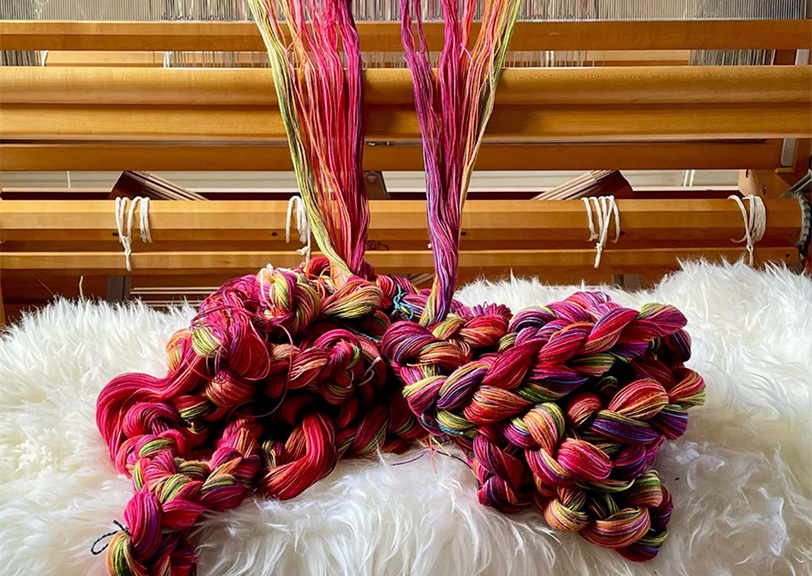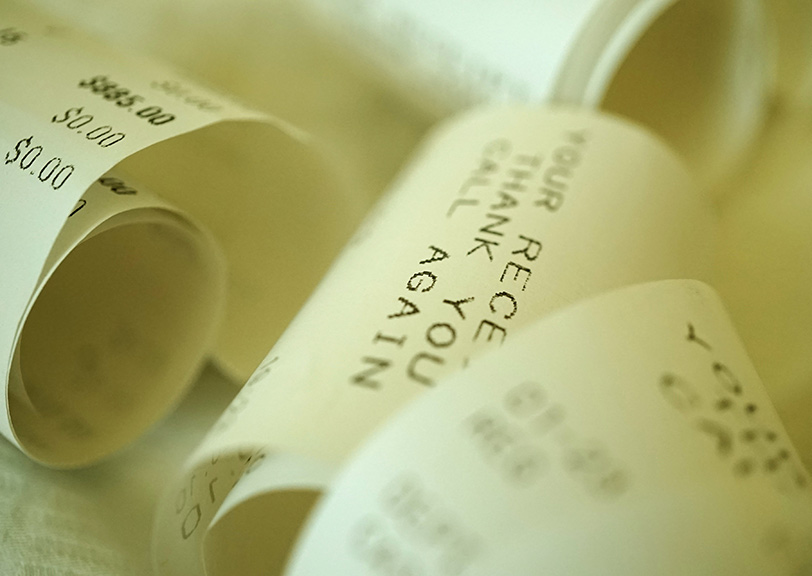ENTER YOUR EMAIL TO RECEIVE OUR WEEKLY NEWSLETTER
The City as Desire … Manhattan Bottom to Top
A child of the boroughs ventures forth in midcentury New York
By George Blecher
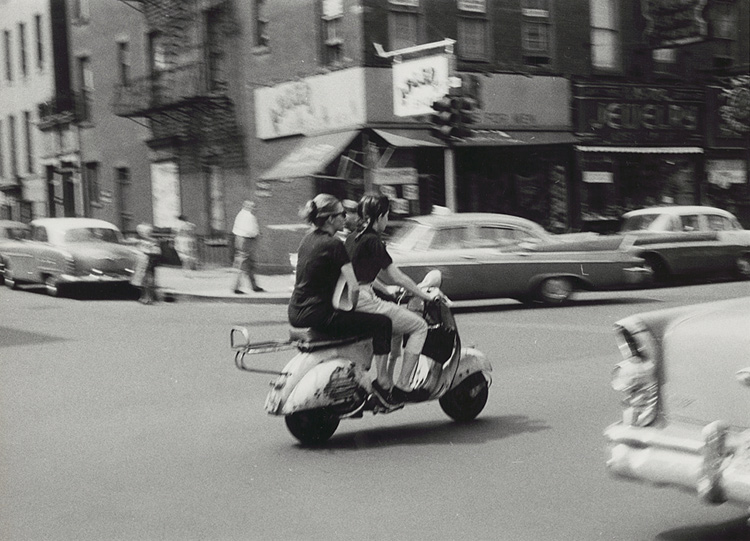
Photos by Angelo Rizzuto. Library of Congress, Anthony Angel Collection.
. . . . . . . . . . . . .
June 6, 2023
On certain spring Saturdays and occasional Sundays in the almost-suburb where I grew up, the Riverdale section of the Bronx, I’d sneak out of the house early because I had a lot of ground to cover. I don’t remember what I said to my mother about where I was going. I couldn’t have told her where I was really going because I couldn’t have put it into words: I was going to the future, to everything I desired. I was going to life itself.
The operative word was desire: I was pure desire.
Because kids played outside in the early 1950s, and the City—Manhattan—was relatively safe—you could ride the subway day or night without fear of being mugged—and because it was spring, my mother may not have been more worried than usual. On bad days her forehead was drawn tight over her eyebrows. On bad days she not only worried, she grimaced and sighed in pain and her lips became thin and gray because she seemed to believe that anytime I introduced an idea or a plan that wasn’t hers, someone was plotting to hurt me—and her as well. Her sigh, her pale lips, her frown felt like an axe blow. The promise of the day was cast in fear; venturing into it was fraught with danger. I wouldn’t be able to survive without her. Even if I did, there would be consequences when I got home: I’d be grilled about what I’d done during the day, and I’d have to be careful not to report anything that she’d consider reckless or dangerous because then there would be more questions, more grilling, I’d have to rack my brain in advance to figure out what she would think I’d done to put us both in danger—until the day drained through my fingers, became less and less mine, more and more hers.
But on those spring Saturdays, curiosity must have trumped fear. I sped out of the house into the light yellow spring air. I walked fast, on the edge of a trot, like a colt beginning to feel a gallop in his spindly legs. Or did I strut like a flaneur, pointing my toes outward, pleased with myself but scared, whistling to keep myself from turning around and running back?
Mostly, I must have been ecstatic. It was spring. The fires of spring. The air was painfully fragrant. My heart was pumping hard. The future had a palpable shape, like a giant basketball I could almost grip with both hands. I shut the garage door and headed toward everything I wanted, and everything I didn’t know I wanted but was waiting for me to want.
I had hardly any sense of what the City was like: I was a child of the boroughs. I just knew it was the place I needed to explore—not even to explore, but just to be there, not in a big house in a quiet neighborhood but someplace where people were massed as thick as trees in a forest, where they were loud and active, as impulsive and unpredictable as my neighborhood was silent and guarded.
That early on a Saturday, hardly anybody was on the bus except for a few Black women whose arms were loaded with bundles of hand-me-down clothes. They were talking and laughing, glad to finally relax and slip out of the maid-roles they’d been playing all week. I was scared of the hacking, exaggerated laughter that made them double up in their seats and cover their mouths, but I was attracted to it too. Even at age twelve or thirteen, I knew that they’d been playing roles all week. What was not clear to me yet was why they’d had to. For them, the City started the minute they changed out of their uniforms into civilian clothes and they left the big houses of the almost-suburb before their bosses were awake; for me the City would only start when I got out of the subway at the Battery, and not even then. It would be years before I could plunge headfirst into the City, but at least now I could get a glimpse of a future at the small end of a telescope.
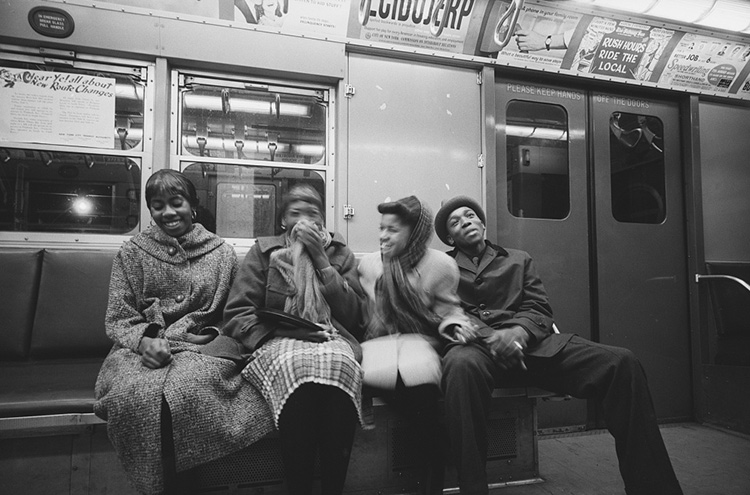
I got on the subway at the north end of the line. The doors of the cars yawned open to air them out. My line was the A, top of the line, the fastest line: Duke Ellington had already established its superiority over the others. The cars were newer and shinier than those of the other lines, and even emptier than the busses. When the train got going, it hurtled down the tracks, clattering and crashing with breakneck urgency, as if it knew the importance of my mission. Coming up from the subway at the Battery, I could smell the ocean, or the particular silty, laden, garbagy-fragrant smell where ocean and river met. The light was paler and softer than in the almost-suburb; it suggested open spaces, the whole opening ocean. But that wasn’t where I was headed. At that time, the ocean held no interest for me. The City, the slab of island, was what I dreamt of, and even those dreams were impressions without continuity, without a coherent story or a coherent focus; they were just pictures, remembered odors, fragments of stories from Sunday evening radio detective shows and Life magazine.
My memories of those weekend treks—I must have taken them ten or twelve times over the course of a few years—from the bottom to the top of Manhattan Island—are as sketchy as the fantasies I had about the City. What I remember most are the feelings: fear and elation. I sped through the day, driven by nervous energy the way a Lenape boy must have felt when he was sent out by the tribe on his first deer hunt in the cave-filled hills of the area now known as Inwood Park. Manhattan was a kind of woods in the 1950s. Dark. Buildings close together. No glass buildings yet. Concrete and brick. Austere buildings. No glitz; the concept hadn’t been born yet. But also plenty of small, old, neglected tenements or store-warehouses that had managed to survive the wrecking ball because no one cared about them or the real estate they stood on. Some had fire escapes, but the ones I’m thinking of were tipsy, comical little buildings, the kind you’d see in old cartoons. Everything was dirtier in those days, the streets, the buildings, no doubt even the people. Nobody washed and sprayed themselves or the buildings to look shiny and expensive; it was before everything, even appearances, was for sale.
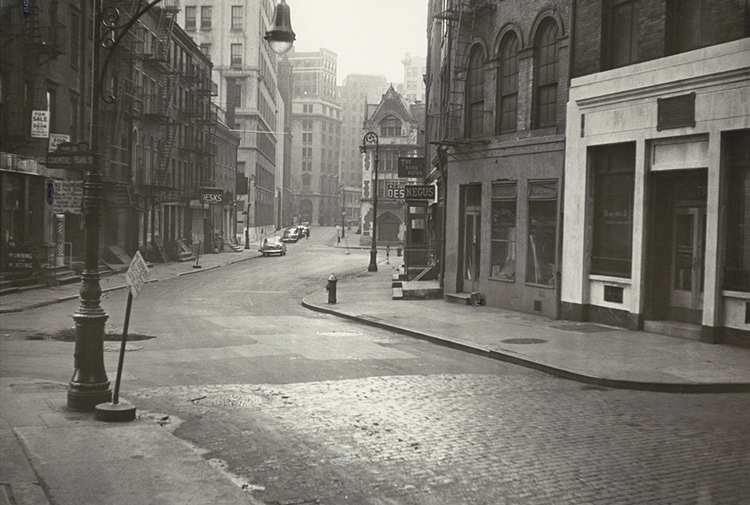
On weekends the Wall Street area was deserted. Dark shadows. Silent, serious, a concrete cemetery. Was I even aware that Wall Street was the center of the riches of the world? I must have been, but nobody talked about it much: it was monolithic, untouchable, uninteresting. The streets were narrow, twisty, not like those in the bustling City in magazine photos. I peered down those streets instead of exploring them. But above Wall Street, in the areas east and north of the courts—Canal Street, Chinatown, Orchard Street—suddenly there were people. Hordes of people. Crowds. Throngs. They were what I had come for. I didn’t pay attention to whether they were ethnic Chinese, Italian, Jews, Ukrainians, Puerto Ricans; it was their energy I needed. People who smelled and spat, who were swept up in their lives and with one another. Stores were open to the street, food markets, clothes markets, tray after tray of hardware, no difference between inside and outside, stores piled and stacked with leather jackets, raincoats, suits, shirts, mechanical devices and machine parts, vegetables, fruit, fish, meat, everything, a universal market, everything I could imagine and much that I couldn’t. Talk. Motion. People selling things, always things to sell, people standing outside their shops, smiling, challenging, studying you, coaxing you to come in. Where I lived, in the almost-suburb, there were hardly any stores. People never came out of their houses except to go somewhere else. Slaves instead of masters of their houses, they had to make sure the rooms were vacuumed and the pillows puffed. I was running on instinct and desire, I didn’t know what I was looking for but it was somewhere in those crowds of people buying and selling, pushing and jostling, elbowing and shoving and shouting and beckoning and waving, reaching over each other’s heads, brooding looks, angry looks, sudden smiles and quick gestures of surprise, delight, annoyance—movement!
I slunk through the crowds. I was afraid of their seeing me looking at them, just as I was afraid of the women in the bus: their freedom, looseness, unpredictability. In those days I was afraid of pretty much everything. It was my habit to be afraid, my go-to emotion; being afraid took up almost all of my time. Looking at those crowds also made me lonely. It wasn’t that I felt excluded, I just didn’t want to feel apart, I didn’t want to be afraid, I was angry and ashamed, that’s why I was there in the first place—to test myself, push myself the only way I knew. But all I could do was look in from the outside.
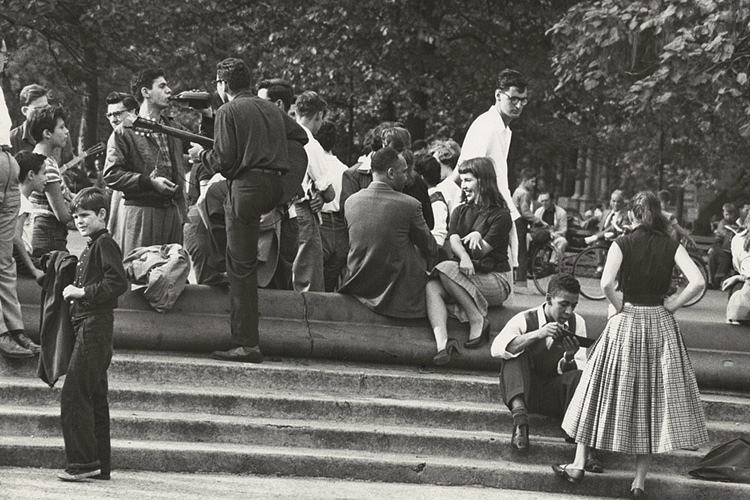
I might have walked through Greenwich Village, and there might have been at least a few coffee houses, men with beards and long-haired girls who made my groin stir with a more immediate kind of desire; and I might have walked east and passed the art galleries on 10th Street and the beginnings of what was to be the counterculture; but that belongs to a later time. I was too young to be searching for art or girls or Bohemian liberation. I was looking for something simpler and more elemental: some way not to be afraid.
In Midtown the City changed, became more familiar. The people looked more like my mother and father, with ties and jackets and hats and long coats and more purpose than pent up energy in their walk. They were all going somewhere; they weren’t home. The streets were straighter, wider, more open to the sky, the buildings taller and less interesting. This was my father’s territory. His law office was on 43rd Street in Times Square, in the Paramount Building that I was sure was the building from which the Bat Signal was beamed. In the daytime 42nd Street was more of an amusement park than a den of sex and drugs. In the daytime it was all red and yellow painted signs, running garlands of lights along twenty movie marquees, smells of oily cooked food (popcorn, hotdogs) and the mysterious, dream-inducing freon smell of air-conditioning from deep inside the caves of movie theaters, a dark, sweet smell, a mixture of piss and velvet. There were arcades where you could play pinball, steer cars on movie-screen roads, emboss your name on fake coins. Little crowds of tourists getting bilked by three-card monte hustlers. And Hubert’s Flea Circus at the 8th Avenue end, a truly amazing place where you watched through magnifying glasses fleas actually pulling tiny chariots and playing tiny soccer games. But except for the dark air conditioning smell, 42nd Street didn’t scare or excite me, didn’t awaken my desire. I had been in amusement parks before. Maybe at night it would have turned me on more; in daytime it was honky-tonk.
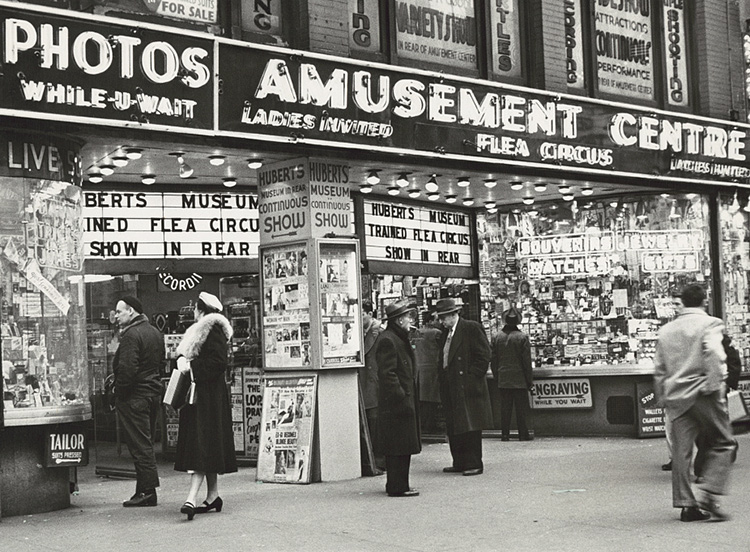
I walked east to 5th Avenue and the department stores. Now they were mysterious, intriguing! Each was a bastion, a little country, a city state. You pronounced their names with awe, like reciting military ranks: Lord & Taylor, Best & Company, Saks Fifth Avenue, Arnold Constable, Bonwit Teller. These could have been the names of palaces, country estates, battleships. Their show windows were as wide as movie screens, the clothes almost military too, with broad shoulders, buttons up and down the chest, made of rich, thick fabric intended to last for years. I pulled back the heavy doors and went in. Immediately the smell of air conditioning, but milder than that of movie theaters, less seductive. I wasn’t interested in the merchandise as much as the fittings—the glass cases, gleaming floors, high ceilings, brass railings, embossed elevator doors. The atmosphere was palace-like, church-like. Deeply quiet. Reverential. Everyone walked slowly—not exactly strolling, examining, looking at the merchandise with studious curiosity, not tiptoeing but aware of how the soles of their shoes touched the polished wood floors. Floor walkers with carnations in their lapels walked through the aisles like palace guards. Tall ladies with powdered faces stood behind the counters with their hands folded, smiling quiet smiles, not overeager, a touch aloof, dignified receptiveness, always at your service but reserved like my sixth grade teacher Miss Porter, who treated us children like the little grownups we were becoming. Other smells: perfume, cologne. The expressions on the faces of the customers—their elegant restraint—suggested that they could afford anything in the store but had no interest in being ostentatious. Their goal was not to show off their wealth but to be their wealth—personifications of prosperity. They didn’t need to shoplift; it would never have entered their minds. They had all they wanted—as well as every right to be there. They were a permanent part of the setting, as much as the display cases and the embossed elevator doors. Everything and everyone exuded a sense of quiet privilege.
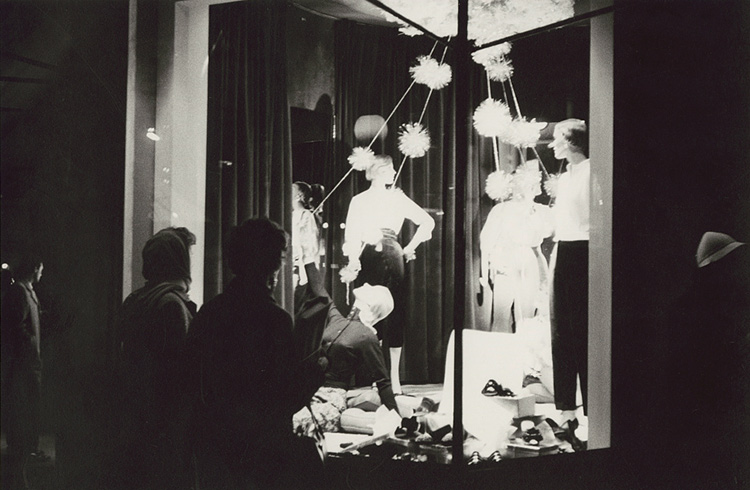
Wasn’t this what my parents worked so hard to acquire—why my father worked twelve hours a day, six days a week in this same City, why my mother haunted her own house, cleaning both ahead of and after the cleaning person, so that no blemish would mar the perfection? Yet Saks Fifth Avenue was thrilling, and my own home sad and suffocating. Was it because we were like the maintenance staff in a museum, treating every object like something precious but dead, while in Saks Fifth Avenue and the other department stores you could sense a slow, stately, living pulse?
By now it was lunchtime. I bought a hot dog and orange soda from a stand at 59th Street and plunged into the Park. It was more deserted in those days, less kept, more woodsy. Nobody treasured and fussed over it, nobody considered each inch of soil precious. Trees grew more haphazardly, the grass wasn’t cut regularly, hardly anything had a name plaque on it. You hiked through the Park looking both ways, but this was before drugs made it hazardous, so the danger was minimal. I did something that I would have been embarrassed about had anybody I knew seen me. I shed five or six years, went into a sort of crouch, and started pretending to be that Lenape boy on a vision quest or his first deer hunt—darting in and around trees and rocks, nosing around patches of woods, coming upon lonely tarnished statues standing on pedestals staring out on nothing, climbing and hiding behind boulders, not exactly defenseless, feeling a young man’s strength and speed. Was I really just pretending? Wasn’t my vision quest as legitimate as any Lenape ritual—trying to find in myself the bravery I needed to live the rest of my life?
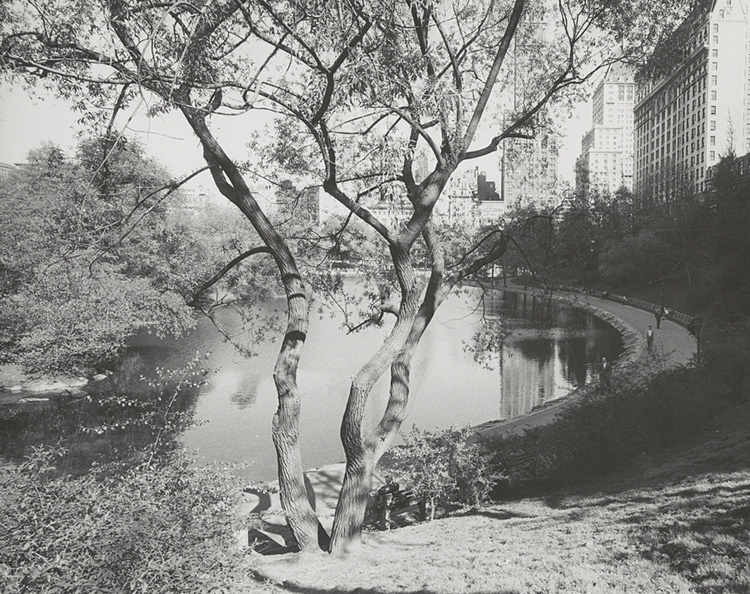
It is hard today to picture the Park as empty. Of course there were people strolling, families with babies, horse-drawn carriages, bums and hoboes, but essentially it was my private playground, my dream-space, empty enough to fill with my particular fantasies. I hadn’t heard of Olmstead and Vaux, didn’t know that every rock and tree had been placed as part of a strategic design. Since third grade I had privately imagined that I was an “Indian,” and now, in addition to being in the forest alone, I was stalking the White Man—more specifically the Redcoats. It wasn’t the killing that I cared about but the stealth, silence, the sense of expertise. The Lenape could do all this because the island was their territory. Their home. They belonged here. They knew every stream and boulder. I wanted to belong here. To the tribe and to one of the Lenape clans—Wolf, Bear, or Turkey (I remembered everything I’d learned about them in third grade.) To be sent off by my clan to the Manhattan woods to become a brave: I couldn’t imagine anything better.
At Harlem Meer the woods opened up, giving way to a view of a kind of lake where boys sat smoking or throwing rocks, and beyond it wide avenues that stretched spear-straight miles up into the island. Of all the places in Manhattan, Harlem scared and excited me most. White boys were not supposed to be there; if there were any other Whites on those Saturday afternoons, I didn’t see them. I had no guideposts at all, was completely on my own. I was as thrilled as I was frightened. I wasn’t myself anymore, I was just my body—observing eyes, heart pounding like a boulder bouncing down a hill.
It seems to me that I walked slower, not faster, during this part of my hike. My knees might have been knocking, but I slowed down because everybody walked slower in Harlem, less nervously than on the rest of the island. Some people just sat. Lounged. Stretched. Sat in odd, relaxed poses on the stoops. Talking, laughing, like the women on the bus. You had to walk slower. It wasn’t cool to walk fast. My body sensed that. I slowed down.
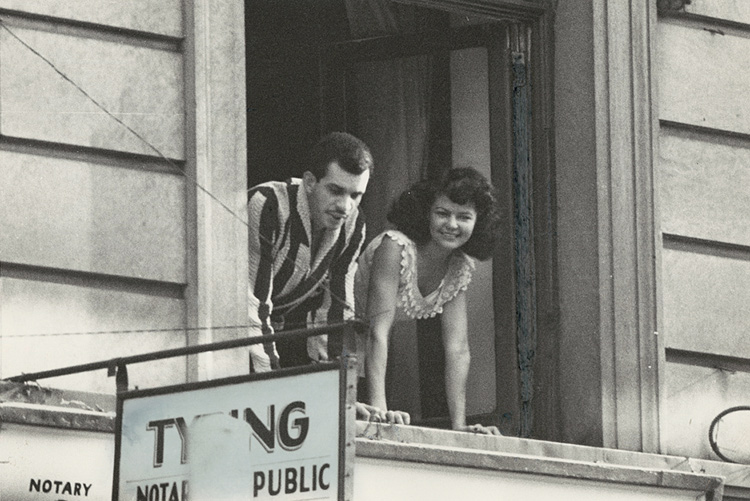
Music came from open windows of upstairs apartments—radios, or people playing Victrolas. Dinah Washington. Perry Como. Kay Starr. Ray Charles. Here and there groups of boys harmonizing doo-wop; or each one standing, listening to his vacuum tube portable radio, bigger than a boom box, as heavy as a suitcase. Cooking smells from the apartments. Fried foods: Caribbean smells? In the streets, smells of dogshit, plenty of dogshit.
The mood was different here from all the other places I’d trekked through. On Orchard Street and in Chinatown people milled around and talked fast, at the top of their lungs, always with an edge of complaint in their voices. On 34th Street and 5th Avenue people walked in straight lines, as if shopping were a serious business whose purpose carried with it an element of menace. In Harlem everybody seemed to be playing. Though I couldn’t have analyzed it then, now I see it as a complicated form of play—game playing, ball playing, flirting, dressing up, and striking a pose, always a sense of performance, an invisible audience or maybe not even invisible: people were always checking to see who else was looking. Men in shirtsleeves and suspenders played cards and dominoes, slapping the bricks down with a flourish. Girls, sometimes in tight dresses, walked down the street looking over their shoulders at ogling boys—then, unable to keep their cool, cracked up laughing. It was more giggles than belly laughs, but you could hear their relief, as if they’d been holding their breaths but couldn’t any longer and let themselves burst out in pure pleasure: I had never seen girls nearly as alluring. The boys played too—not only games like stoopball but cards and dice, or they just leaned against the brownstone bannisters with one hand in their pocket and in the other a cigarette, smoking like tough guys in the movies, glaring down the end of their noses if they caught me looking at them, definitely guarding their territory. A few times they said, “What you doing here, White boy?” but at other times they couldn’t maintain their menacing expressions and broke into laughter like the girls, snorting and slapping their thighs.
A boy no bigger than me said to me once, “Don’t be afraid, White boy. Ain’t gonna bite your head off.” He said it like he wanted to be friends.
I was more embarrassed than afraid. And not even that: I think I became less tense as I walked along. Of all the people I observed during the day, these were the only ones who actually looked back at me and seemed to see me. Not only because it was an uncommon sight for a White boy of thirteen to be wandering around in Harlem, but because, perhaps out of a mixture of caution and curiosity, they were truly observant. Maybe that went along with performance—the act of seeing and being seen. In any case I was seen, which was probably a part of what I was searching for all along.
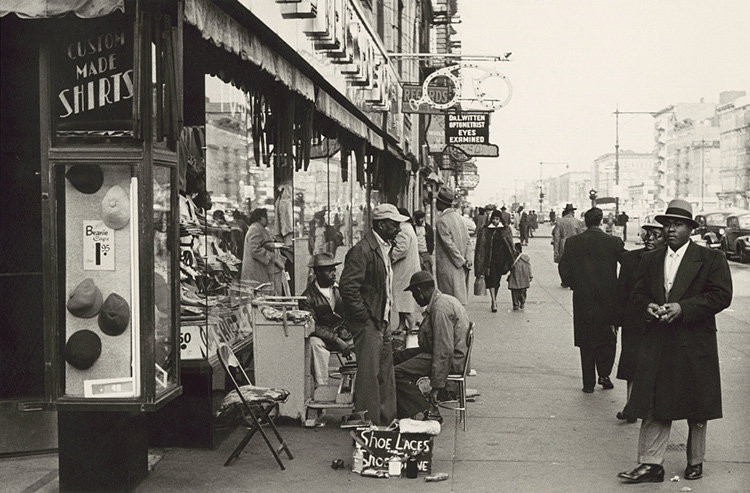
Almost at the top of the island was the Jewish neighborhood where my family had lived before we moved to the almost-suburb, and where aunts and uncles and cousins still lived. Most of the buildings had been built in the 1930s—pale yellow-brown brick with beige-painted fire-escapes and gently curving, plump facades, the wave of brief Art Deco-Revival buildings that fill in empty spaces all over the City between bigger buildings built ten years earlier. A quiet, purely middle class neighborhood in a time when that definition had meaning.
Feet burning and calves sore, I walked up two-block-long Ellwood Street past the vacant lot and P.S. 24 on the other side of the street to my old building, climbed the first level of wavy steps to the door, and sat down to nurse my feet. After a couple of minutes I picked myself up, went to the front door and peered through the little window into the lobby at the curved cast iron railing, the black polished floor of what looked like marble with confetti sprinkled on it. I remembered the details inside the building: the coolness of the lobby, the dark wooden elevator with the bulging metal number buttons, the apartment’s sunken living room, the kitchenette-booth, the view of the schoolyard from the living room window, the crowded bedroom—and the bathroom, the only place where I could hide.
This had not been a happy place. It had been full of turmoil: my lonely immigrant mother; my shy, distant father. In the air always hung a threat of impending conflict. But I think I knew even then that my mother’s anger, her migraines, her hysteria and exaggerated sense of a dangerous world around her came from outside her, weren’t the deepest part of her nature. I also knew that the apartment had been a home, however imperfect, at least during those times when the stars were aligned. So I felt good enough to revisit the block and building with curiosity, if not nostalgia.
No doubt it had something to do with the day’s trek. In walking from one end of the island to the other I’d been building up muscles in my calves and thighs. The day had changed me—not in a way recognizable to others, but I could feel that my body wasn’t just tired, it had been well used. My vision was clearer, calmer; I looked out at the world with less urgency and sense of deprivation. I was also very hungry.
Most likely I’d found a phone booth along the way and called home to say I’d be late—not too late, for that would have fired my mother’s nerves and polluted the day. By the time I got home, my father and mother would already have eaten supper. Most likely my father was puttering in the garden while my mother sat in the kitchen, reading the newspaper. The evening sky still had a patina of light. My mother had saved dinner for me, I ate it at the kitchen table under a halo-shaped fluorescent fixture. If my mother didn’t probe too deeply, I’d offer a vague, laconic story about running into some friends and playing basketball all day; or maybe a cloak of adolescent privacy, invisible but impenetrable, had already lowered over me, and I didn’t offer any explanation at all.
I went quickly to my room up the back stairs and shut the door tight. I was pleased with myself. The spring air had been light yellow and seductive and flirtatious and promising, my body and I knew it, that’s what had drawn me out the door in the first place. It really had been about desire, yearning never quite fulfilled, always going up to the edge, on the edge, never completed but the longing had been both a cue to push myself further and a kind of fulfillment in itself.
Part of me felt like telling my parents what I’d seen and done during the day, but a more forceful voice told me not to:
It is yours. Protect it. You will need it for the future. Yours. Only yours. Do it again next week.
George Blecher writes for The New York Times and for a number of European publications about American politics and culture. See georgeblecher.com
Enjoy more of George Blecher’s stories on NYCitywoman.com:



